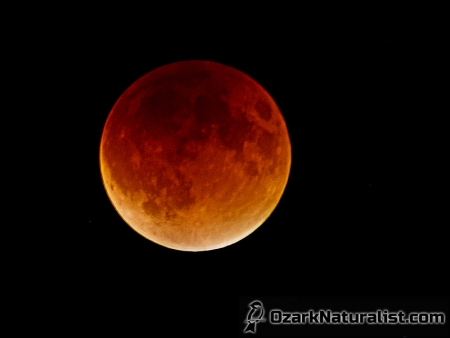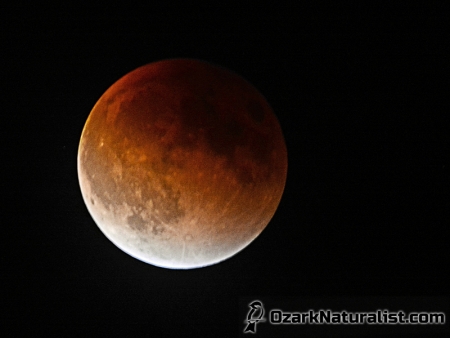That’s not really fair. This, of course, was during the total lunar eclipse the other night (9/27) and the red hue of the moon was due to Rayleigh scattering (the same thing that gives us colorful sunrises and sunsets), but that hardly makes it “bad.” Mostly, I really like the song by Creedence Clearwater Revival and was just looking for an excuse to swipe that line as a post title.
I took that photo just after the eclipse passed totality and I very nearly missed it altogether. I’d gone out right before dark and the sky was still completely overcast, like it had been all day. So I gave up, went on to something else and forgot about the eclipse (and getting my camera gear prepared). Then about 9:30, I took the dogs out to do their business, realized I could see stars despite the yard lights and started looking for the moon.
I wasn’t sure exactly where in the sky to find it, but knowing it would be opposite the sun, I looked east. It was higher than I had expected and, y’know, darker than usual, but I finally spotted it among the trees. I got the dogs back inside and started scrambling around gathering what I needed to shoot some photos. In the meantime, the eclipse wasn’t waiting around for me, the moon continuing to move through the Earth’s shadow whether I was ready or not.
I couldn’t find my heavy tripod on such short notice and I had a terrible time getting the one I could find to stabilize my 600mm lens. That’s why the photo above is not quite sharp, even though I was letting the camera settle for 10 seconds or so before shooting and firing the shutter using a wireless remote. Very frustrating.
I finally overcame my laziness (a little) and removed the strap on the camera. That helped a little and I finally got a couple of fairly sharp images. Unfortunately, the eclipse was now well past it’s climax.
I have some issue with this being touted as a rare “Supermoon” eclipse. “Supermoon” refers to the moon being full while at it’s closest approach to the Earth (perigee). It should seem to be a bit larger than normal, though I honestly couldn’t tell any difference. Eclipses coinciding with a “Supermoon” occurred in 1910, 1928, 1946, 1964 and 1982 and another will happen in 2033. Based on that admittedly small sample, Supermoon eclipses occur, on average, every 20 years or so. I don’t consider that a rare event, especially in the cosmological sense. I’m just saying.

